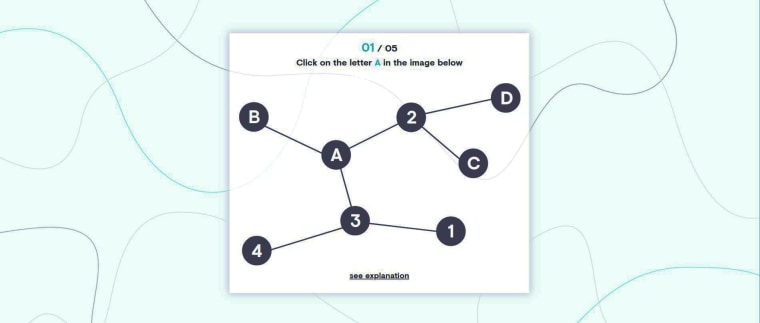As long as the world makes sense, it’s hard to imagine what it’s like to live with dementia.
So experts in the U.K. have created a series of puzzles to show healthy people how confusing, frustrating and stressful daily life can be when nothing seems right.
The puzzles, developed by Babylon Health and the Dementia Trust UK, appear simple but they’re actually impossible to solve. They mimic the experience of a person who is suffering from the loss of memory and other thinking skills.
Try the test yourself:
June Andrews, a nurse, dementia expert and author of the advice book “When Someone You Know Has Dementia,” provides commentary at the end of each task to explain how it might make the test-taker feel.
“The horror of failing a test and realizing what it means is visceral and real,” Andrews told TODAY.
“I want healthy people to have some insight into what it feels like because that way they might do the things you can to stay well and delay dementia — exercise, not smoking, being careful with alcohol, keeping mentally active, keeping a healthy body weight — and they might have more sympathy for the people who are affected and their caregivers.”
People with dementia often don’t talk about what they're going through, withdrawing from their friends and feeling ashamed or frightened, Andrews noted. At the same time, most healthy people don’t want to imagine what it’s like because they're afraid, she added.
Some 5.8 million Americans are living with Alzheimer's, the most common type of dementia. The puzzles are meant to replicate what they go through.
The humiliation of not being able to complete a simple task leads to anger, for example. There’s also fear and stress because failing such tests could lead to job loss or a confiscated driver’s license. People might lash out because no matter how hard they try, they feel like a failure. Depression is a common outcome, the project explains.
Andrews advised families to employ the “Don’t Argue and Correct” approach to soothe their agitated loved ones.
“If the person with dementia is getting something wrong — as long as it is not something that will harm them — don’t argue. Just change the subject or let it go,” she said.
“It makes people anxious to know they are getting things wrong — as it would if you do the puzzle — so try to keep life simple so that they don’t get things wrong, and if they do, don’t point it out or stress them about it.”
June is Alzheimer's & Brain Awareness Month
Close family members are typically the first to notice memory issues, but they’re often hesitant to say something, the Alzheimer's Association noted. At the same time, almost nine in 10 Americans say they’d want others to tell them if they were showing signs of dementia, the group found in a new poll.
Its new campaign, titled “Our Stories,” urges families to talk about any cognitive issues sooner, leading to an early diagnosis, which means more time for planning and better disease management.
The association’s tips to start a conversation include:
- Try saying, “I’ve noticed [an out-of-the ordinary behavior] in you, and I’m concerned. Have you noticed it? Are you worried?”
- Discuss going to a medical appointment together: “I think it would give us both peace of mind if we talked with a doctor.”
- The first conversation may not be successful. Be ready to have another.
If you're questioning whether to bring up the topic, the Alzheimer's Association also has a list of 10 early signs and symptoms of the disease. If you notice any of them, it's worth having a conversation with your friend or family member.


